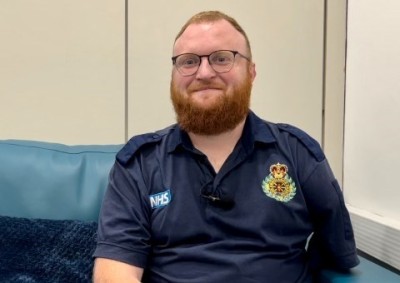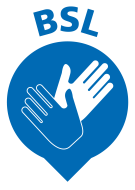Digital education lead at North East Ambulance Service shares his story as part of Disability History Month

“I was worried about someone not giving me the chance to prove that I am actually able. Throughout my career at NEAS, I have been treated like any other employee and I’ve never felt I was not given a job to do because of my disability. People tend to forget I’ve got one arm, which is great. I’m just Tom.”
Born disabled, missing his left arm from above the elbow, 29-year-old Tom Crow believes his life could be in a very different place if it hadn’t been for the work of national charity, Reach, which support families with children like him – specifically the annual summer camp organised by the charity for children aged 11-17.
He spoke to us about growing up with a disability and how Reach helped him get to where he is today, a married dad-of-one and working his way up through North East Ambulance Service over the past nine years to where he is now, leading on digital learning for all colleagues.
“Up until starting secondary school, I had had a fairly good experience at school,” he said. “Reach had supported my parents to allow me to find my own way to do things so I was quite adaptive; it might have taken me a little bit longer, but I could always do what all the other kids could do, and the only thing I really got picked on for was my ginger hair!
“But I was about to move into high school, moving from a small school of about 200 kids where everyone knew me to one of the biggest schools in Newcastle with about 2,000 kids.
“I was so determined to be the same as everyone else, I just wanted to have what everyone else had and find my own way through.
“I remember getting on the coach at Washington services aged 11 for the 12-hour journey down to Cornwall. It was the first time I’d been away from my parents and I don’t know who was more scared, me or my parents! But when I got there, everyone was like me and seeing how confident the older kids were gave me some reassurance that everything was going to be alright.
“The week-long camp was all outdoors-based with activities like rock climbing, canoeing, abseiling, surfing and archery. I had been a scout and loved the outdoors, but this was the first time I had been exposed to such extreme things.
“The first task is to make your own bed. I remember being wrapped inside a duvet cover trying to work out how to do it! But there was such a sense of achievement when you managed to do something.
“The whole idea behind having the younger and older kids together was that the younger ones learned from the older ones; they would show you how you can adapt things in your own way.
“The biggest thing for me, looking now as an adult, is the little things you learn from the older ones – it’s not whether they can climb a wall, it’s that they see someone else with a similar condition to them using a knife and fork or tying their shoelace or packing their bag in a way they hadn’t thought to do it because their parents can’t show them. The girls, for example, will show each other how to tie their hair.
“I’ve always felt I needed to prove my ability to people, even now when I’m in a new environment. I think people assume that I can’t do certain things; it often comes from an honest or kind place, trying to do something for me to help me. I had always wanted to be as good as or better than my friends and I remember coming back from that first camp and thinking I’d managed to do things my friends had never even tried!
“I went back every year until I was 17 and every year I came back with more confidence and more friends – people I still speak to now.
“That last year when I turned 17 was horrible because we knew we weren’t going back. It was the highlight of the year because there’s that feeling of belonging – you can truly be yourself without hiding away or pretending to be anyone else and I never felt like I had to prove myself to them.
“Reach helped me to build confidence in myself and my ability and appearance, it showed me I could do anything and my disability didn’t need to hold me back.
“As I said, I’ve always felt I needed to prove my ability, and so the biggest challenge for me is always being somewhere new because I feel I’ve got to prove myself all over again. I was successful in getting an IT apprenticeship at NEAS just before I turned 19. I was worried about someone not giving me the chance to prove that I am actually able.
“Not long after I started, someone in the team offered to collect a delivery of boxes for me that had come into reception; it came from a kind place, but I made a point of saying I could do it myself because I didn’t want them to feel they had to babysit me – I wanted them to see that it might take me two trips but I can do it myself. I never felt like I was treated any different from that point on; the team were really accommodating, buying a specially adapted van but I was treated like any other employee and I’ve never felt I was not given a job to do because of my disability.
“I’ve progressed quite a bit through NEAS over the past 10 years, working my way up from an IT apprentice and through the service line roles until moving into training. I now look after the Trust’s statutory and mandatory training programme, e-learning development and how we use technology in the education team, including the new simulation technology we recently invested in for clinical staff.
“People tend to forget I’ve got one arm, which is great. I’m just Tom.
“When I turned 21, I was accepted as a mentor and I’ve volunteered every year ever since, helping to make sure kids growing up now have the same opportunities I had. As a mentor you take on a guardian role, collecting them on the coach and then making sure they’re up and ready each day and generally looking after their welfare.
“We have a lot of fun and go through a lot together; I’m the one holding their hand when they’re scared, I’m the one giving them that courage and confidence and it’s nice to see them develop over the week. Just like any kid, they are so shy when they first arrive but by the end of the week you can’t shut them up! It’s great seeing their confidence grow and knowing you’ve played a part in that.
“As a parent myself, I can only imagine how scary it is to find out your child is disabled; you’re worried that they won’t be able to achieve the things they want to or that they’ll be treated differently to everyone else. As they grow up, I can see why you’d want to do things for them, to help them. But disabled kids don’t need to be wrapped up in bubble wrap, they need to be encouraged to do things for themselves.
“I hope I am proof that having a disability doesn’t need to hold you back.”
Find out what career opportunities are waiting for you at NEAS.

